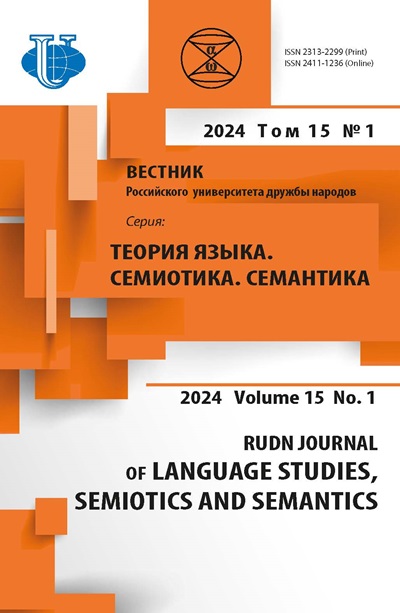THE LACK OF TURKIC COMPLEX SENTENCES AS A CONSEQUENCE OF THE INTERNAL STRUCTURE OF AGGLUTINATIVE LANGUAGES
- Authors: Dubrovina ME1
-
Affiliations:
- Sankt-Petersburg State University
- Issue: Vol 8, No 3 (2017)
- Pages: 563-570
- Section: Articles
- URL: https://journals.rudn.ru/semiotics-semantics/article/view/17017
- DOI: https://doi.org/10.22363/2313-2299-2017-8-3-563-570
Cite item
Full Text
Abstract
The article discusses a fragment of the syntactic subsystem of the Turkic languages, com-plex sentences, from the standpoint of systemic linguistics. Turkic languages have their own features, which often distinguish these languages from the Indo-European languages. These differences may be typo-logical: the Turkic languages are agglutinative, they've got a special law which governs the whole system- quality-indicative determinant, which manifests itself on the syntactic level too. The article provides some interesting facts from the field of Turkic syntax, and demonstrates the ability of the language system to dispense with the usual for Indo-European languages dependent clauses.
Keywords
About the authors
M E Dubrovina
Sankt-Petersburg State University
Author for correspondence.
Email: spbu@spbu.ru
Dubrovina Margarita, PhD, Associate Professor (docent), Faculty of Oriental Studies, the Department of Turkic Philology at Sankt-Petersburg State University; Scientific interests: Linguistics, theory of Turkic grammar, comparative linguistics of Turkic languages, ancient Turkic language (the language of the runic monuments), the Yakut language, the Turkish language; methods of teaching Turkish language
Universitetskaya embankment, 7/9, Saint-Petersburg, Russia, 199034References
- Ahmanova, O.S. (1966). Dictionary of linguistic terms. Мoscow: Sovetskaya ehnciklopediya. (In Russ.).
- The grammar of modern Yakut literary language. (1982). Phonetics and morphology. Мoscow: Nauka. (In Russ.).
- Guzev, V.G. (2006). Experience in the development of the theoretical foundations of the description of the Turkic functional syntax. Oriental studies. Philological research, Issue 27. St. Peters¬burg: Izdatel'stvo Leningradskogo universiteta. (In Russ.).
- Guzev, V.G. (1990). Essays on the theory of Turkic inflection: Verb: on the material of old Anatolian Turkic language. Leningrad: Izdatel'stvo Leningradskogo universiteta. (In Russ.).
- Guzev, V.G. (1976). System nominal forms of the turkic verb as a morphological category (on the material of old Anatolian Turkic language and Turkish languages). Turcologica. Lenin¬grad: Nauka. (In Russ.).
- Deniz, Yilmaz O. (2016). The Category of the nominalization of actions in the Turkish langu¬age. St. Petersburg. (In Russ.).
- Dubrovina, M.E. (2016). Some words about the term «substantival-adjectival form» (SAF) for verb-noun forms of Turkic languages. In Topical issues of Turkic research, N.N. Telitsin, J.N. Shen (Ed.). St. Petersburg. pp. 49—54. (In Russ.).
- Dubrovina, M.E. & Mukhitdinova, H.S. (2011). Comparative-typological analysis of the parti¬ciple with the index -gan in Uzbek language. Russian Turkology, 2(11), 41—48. (In Russ.).
- Kononov, A.N. (1956). Grammar of modern Turkish literary language. Мoscow: Nauka. (In Russ.).
- Kopnin, P.V. (1973). Dialectics, logic, science. Мoscow: Nauka. (In Russ.).
- Melnikov, G.P. (1969). Syntactic structure of Turkic languages from the standpoint of systemic linguistics. Journal of the peoples of Africa and Asia, 6. Мoscow: Nauka. (In Russ.).
- Sevortyan, E.V. (1961). About some questions of the complex sentence in Turkic languages. In Studies on the comparative grammar of the Turkic languages. Part III. Syntax. Мoscow: Izd-vo AN SSSR. (In Russ.).
- Ubryatova, E.I. (1976). Studies on the syntax of the Yakut language. P.I. Complex sentence. Novosibirsk: Nauka. (In Russ.).













